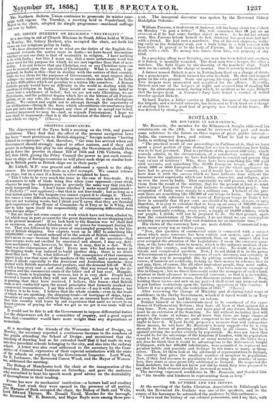SCOTLAND.
MR. BOUVERIE AT KILMARNOCK.
Mr. Bouverie, the member for the Kilmarnock Burghs addressed his constituents on the 18th. As usual he reviewed the past and made some reference to the future on three topics of great public interest— India, the currency laws, and reform. What lie had to say about India is striking but despondent-
" The practical result of our proceedings in Parliament is, that we have spent a great portion of time during last seseion in considering how India was to be best governed. That is a problem of the greatest difficulty, which scarcely admits, in the circumstances, of a satisfactory solution. What have been the appliances we have had hitherto to control and govern this vast extent of territory ? Why, there have beea something like 900 paid civil servants, and something like 30,000 European troops, officered by about 5000 or 6000 European officers. These are the whole appliances we have had to govern that country, and it would have been impossible to have done it with the success which we have hitherto done without the immense moral superiority which our habits, character, and religion, give us over the races in India. That superiority we still possess; but it is ob- vious from the result of the mutiny, that for the present at least we must have a larger European Power than hitherto to control that people. Our occupation of India must simply be a military one. I believe at the pre- sent there are something like 100,000 of our troops in India. The ordinary calculation with reference to the waste of European troops in India I be- lieve is annually that 10 per cent, are disabled by death, disease, or age ; therefore, it is easy to calculate that to keep up an army of 100,000 men— setting apart all question of replacing old regiments by fresh ones—we must be constantly sending, every year, a supply of 10,000 soldiers, which our people, I think, will not be prepared to do. On that ground, apart from the consideration of the climate, I do not think we can contemplate retaining our possession of that vast dominion for an indefinite time."
His views of the currency laws are more definite. Commercial tem- pests occur every ten or twelve years.
"Now, this question of commercial crisis is connected with a subject about which more nonsense has been written and spoken, and a greater amount of practical blundering committed, than on any subject that has ever occupied the attention of the Legislature—I mean the currency ques- tion, or the laws that relate to money, which is the ordinary medium of ex- change in this country, and the standard of value. No doubt it is an in- tricate and complicated question. Now, I do not think it is in the power of Government to prevent the recurrence of such disasters, and certainly it was not the way to accomplish this by putting restrictions on banks. Of course, if bankers act recklessly, locking up their money in schemes that do not pay, then, of course, like all other imprudent people, they must suffer, and their shareholders be brought to rum. You have seen an example of this in Glasgow ; but no direct laws could make the managers of such a bank prudent in their advances to commercial concerns ; so that it is inevitable, when a commercial storm comes, that disastrous events must follow. Now, holding these views—not new on my part—I shall resist any proposal made to put further restrictions upon the banking operations of this country. I believe it was a great evil, the restriction of 1845." (Cheers.)
After reviewing the change of Ministry and declaring total want of confidence in the Derby Government, which if it dared would be as Tory as ever, Mr. Bouverie had his say on reform.
Neither himself or his constituents need to be convinced of the expe- dience of Parliamentary Reform ; they have all been of that opinion for a long time. Now, one important and main part of any future Reform Bill must be an extension of the franchise. No bill without including that will deserve the name of reform ; for all know that there are large classes of people in this country who are quite competent to use the suffrage and who ought to have it. If Lord Derby proposes a measure that will enfranchise these masses, he will have Mr. Bouverie's hearty support—for he is very strongly in favour of granting political liberty to all classes. But he is against settling the matter entirely by population. Ile does not know that it would be for the advantage of the kingdom if London, with its population equal to that of Scotland, returned as many members as the latter does ; nor does he think that it would be advantageous to the Kilmarnock burghs if Glasgow, with her 400,000 inhabitants, were permitted to represent her peculiar habits and pursuits and feelings by ten times as many as them- selves. Then, let them look at the allotment of representatives to Ireland, the country that gives the smallest number of members to population. Now, if they had recourse to population for deciding the number of mem- bers, they must at once grant fifty additional to Ireland. Ile respected the Irish members, but he did not know nor did he think they were prepared to . say that the Irish element should be increased so much.
The meeting expressed confidence in Mr. Bouverie and thanked hint for "his trouble and kindness in representing them so long."


























 Previous page
Previous page